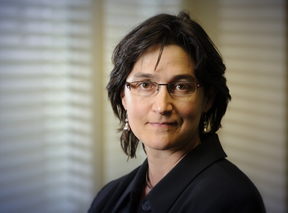On the surface, there’s nothing inspiring about a maximum-security prison – its pale walls, stone-faced guards and army of inmates dressed in white uniforms. Once inside the Donaldson Correctional Facility in Bessemer, however, Alison Chapman, Ph.D., associate professor of English in the UAB College of Arts and Sciences, discovered a magical world, one that inspires and transforms.
 |
| Allison Chapman. Download image. |
Chapman volunteered to teach a one-time class in the prison for UAB’s ongoing lecture series for inmates. Once each month, professors volunteer to teach on subjects ranging from neuroscience to communication studies. She thought it would “make for a good story afterward,” she said. But the prisoners’ hunger for literature turned Chapman’s single trip into a monthly excursion during which she and the men escape their 10-by-12-foot classroom and journey through time with stories by Shakespeare, Milton, Dickens and others.
Chapman wrote about her experiences teaching at Donaldson in the essay “Milton’s Captive Audience: Teaching ‘Paradise Lost’ in a Maximum Security Prison.”
“This was my first foray at creative non-fiction,” Chapman said. “I write dry academic articles with footnotes.”
Initially, the piece ran in PMS poemmemoirstory, a literary journal based at UAB. “It appeared in 2009 and I moved on,” Chapman said. Then, and she’s still not quite sure how, her piece ended up in the hands of author/journalist Christopher Hitchens who was guest editing 2010’s Best American Essays. He included her work under the “New and Notable” category.
“I was like, ‘holy cow,’” Chapman said.
Her essay paints a picture of her leading 17 eager inmates through the Garden of Eden as Milton envisioned it. After teaching one class, the men asked her to come back and teach them more. She did and has been doing so for six years now.
“From the very first class, I could sense the parallels between this group of men incarcerated for years and Milton’s Satan who admits that Hell brings both a ‘pain of longing’ and a ‘fierce desire’ for all the beauty and innocence he has lost,” Chapman wrote.
Donaldson is so overcrowded that the first breakfast shift begins at 3 a.m. to accommodate everyone, she said. Tiny cells made for one inmate house three. Her classroom is like a “walk-in closet” with no air-conditioning that gets hot even in the winter. It’s anything but paradise, she said.
The cast of characters in Chapman’s class is ripe for its own story. There’s Thomas, “a tall Ugandan with wide shoulders” who is her “self-appointed bouncer.” Virgil, “a tall black man with an elegant Southern drawl,” gives insightful analogies. One “white man with thick gray hair and bright blue eyes” can quote “line after flawless line of Paradise Lost, part of Milton’s description of the loveliness of Eden.”
At times, Chapman, with stories of her children and university life, said she felt a little awkward — “a cheery and optimistic cartoon character who has wandered into a Quentin Tarantino film.” This was especially true when a prison guard reviewed her student roster and remarked, “Good God! These guys? I’ll make sure to bring my stick.” Many of Chapman’s students committed crimes so heinous that they will never step beyond the prison walls.
Unexpectedly, Chapman said several of the men developed a crush on her. She wrote that she hadn’t planned to become Donaldson’s “femme fatale.” It was a curious place to be in, she said. She felt like Milton’s Eve. “I wondered if the men’s compliments were genuinely meant or, like Satan’s, attempt to manipulate. Or perhaps both.”
Chapman asked the men to keep a journal of their thoughts about the text, and one of them gave her a compliment of the highest kind, literarily speaking. “…I would tell Mr. Milton there’s someone important he needs to meet,” he wrote, “someone he could learn a lot from. And I would turn and introduce YOU.”
“Why am I doing this?” Chapman wrote in the essay. “Real teaching, I finally realized, is rooted in love, and the only compelling reason to keep going back to Donaldson was that, at some level, I loved these men.”
